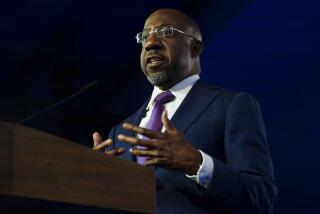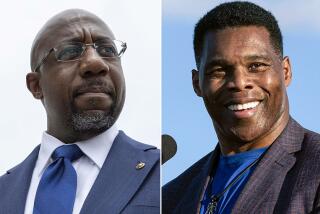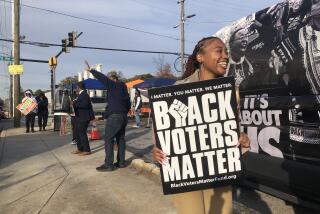Florida primary: Ron Paul fans, foes get mad on Twitter
- Share via
With nearly 100% of the votes counted in the Florida primary, Ron Paul trails far behind the leaders with about 7% of ballots counted.
And his avid supporters are mad -- on Twitter, at least.
The source of their anger appears to be something that took place Saturday in another Southern state, the Tennessee straw poll. In the survey, taken by the Tennessee Republican Assembly, Paul was backed by 63% of the 316 voters who participated.
MOOD METER: Track the nation’s mood on the candidates
Paul’s campaign website wrote about the results under the headline: “In Case You Missed It: Ron Paul Wins Tennessee Presidential Straw Poll.”
A full 16% of “angry” tweets mentioning Paul reference the straw poll, according to an analysis by San Francisco-based Kanjoya.
“A lot of Paul supporters seem to be angry that Paul’s victory wasn’t getting more credit,” said Kanjoya engineer Moritz Sudhof.
The anger seems to be directed mainly at the media. The transgression? Not paying enough attention to Paul.
Tennessee for Ron Paul 2012: Ron Paul Victory at TRA Straw Poll subjected to MEDIA BLACKOUT -- #RonPaul2012
Another poll you won’t see on Fox or CNN. Ron Paul wins Tennessee straw poll with over 63%!
The rising anger detected by Kanjoya, which uses a computer algorithm to assign emotion to social media posts, is a departure in sentiment detected around Paul on most days. Typically, Kanjoya has found the bulk of the conversation around Paul on Twitter has been tied to positive emotions such as “joy” or “surprise.”
The Texas Republican is making his third run for the White House. He was on the ballot in 1988 as the Libertarian Party’s candidate.
The Paul pattern on Twitter is distinctly different from those of the other remaining candidates -- Mitt Romney, Newt Gingrich and Rick Santorum -- each of whom has won a state at this point.
Kanjoya analysts said they believe that’s an indication that Paul’s supporters are highly motivated.
“We’re seeing that people who tweet about Ron Paul are more connected to each other than people who tweet about the other candidates -- i.e., more retweets, more replies, and more mentioning of each other,” said Sudhof. “Therefore, an emotion expressed in a single tweet can propagate throughout the network fairly quickly and cause spikes to happen.”
At the same time, they appear to be talking to each other much of the time. Paul is the subject of far fewer tweets than Romney or Gingrich, who draw comment from a wider audience. And Kanjoya has found it possible to detect emotion more often in tweets about Paul -- 45% of the time compared to about 40% for the other candidates.
On Tuesday, in the hours before and after the polls closed in Florida, Kanjoya also detected a sharp rise in “angry” tweets about Paul that connected him with words such as “newsletters,” “supremacist” and “racist.”
“A full 24% of the angry Ron Paul tweets from the last few hours include these keywords,” Sudhof said.
In December, Paul unplugged his microphone and walked out of an interview with CNN after he was questioned about offensive statements that were mailed to supporters under his name in the late 1980s and early 1990s.
One mailing included the statement: “Order was only restored in L.A. when it came time for the blacks to pick up their welfare checks.”
Paul has distanced himself from the mailings but said he was still morally responsible for material distributed under his name.
Learn more: What sentiment analysis can and cannot tell us about the GOP race
More to Read
Sign up for Essential California
The most important California stories and recommendations in your inbox every morning.
You may occasionally receive promotional content from the Los Angeles Times.











